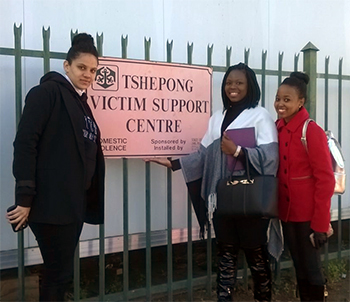Latest News Archive
Please select Category, Year, and then Month to display items
11 January 2021
|
Story André Damons
|
Photo Supplied
 Dr Ralph Clark
Dr Ralph Clark
The Afromontane Research Unit (ARU), the flagship research group of the University of the Free State (UFS) Qwaqwa Campus, has recently been granted R8,4 million to establish a Risk and Vulnerability Science Centre programme.
The Risk and Vulnerability Science Centre (RVSC) programme was established by the Department of Science and Innovation (DSI) as part of the Global Change Research Plan for South Africa and is funded by the DSI through the National Research Foundation (NRF). The RVSC will focus on the need to generate and disseminate knowledge about risk and vulnerability on global change challenges faced by local policy makers/ governance structures and communities in South Africa.
Invited to participate
Dr Ralph Clark, Director of the ARU, says the UFS, together with the University of Zululand and the Sol Plaatje University, has been invited to participate in Phase 2 of the RVSC programme. Dr Clark was approached by the DSI (on referral from the South African Environmental Observation Network – SAEON) in February 2020 regarding the potential for establishing a RVSC at the UFS Qwaqwa campus.
Subsequent interactions were held between the UFS and DSI, and in March 2020, the UFS formally accepted the DSI invitation. It has since been agreed that the RVSC: UFS will be hosted as a RVSC under the ARU umbrella, with dedicated personnel embedded at the UFS in this regard (internal processes and reporting) but reporting directly to the NRF regarding the RVSC.
Interest and support welcomed
Dr Clark welcomed this interest and support from the DSI-NRF, saying that the funds will further assist the UFS in growing its excellent and growing research portfolio and building more research capacity on this traditionally undergraduate-focused campus. “The RVSC will contribute to much-needed solutions in an area marked by major sustainability challenges and will assist in moving Phuthaditjhaba away from its negative apartheid history towards becoming a sustainable African mountain city,” says Dr Clark.
Community Engagement Indaba a platform to engage Free State community stakeholders
2017-01-04

Gender empowerment meets an all-women’s team
of UFS and UCT law students wanting to learn from the
South African judicial system and be ready to fight the
crimes of rape and domestic violence. From the left are:
Robin van Wyk and Rotondwa Mulaudzi, both from UCT,
and Thando Mokaulezi from the UFS.
The University of the Free State (UFS), through the office of Community Engagements, and in collaboration with Bloemshelter has hosted the Community Engagemen Indaba in Bloemfontein since 2013. This is a platform where stakeholders in business, welfare and other community organisations can network and hold dialogues that can bring about solutions to some of the societal challenges faced by Free State communities.
Bloemshelter is an independent and registered Non-Profit Organisation (NPO) and Public Benefit Organisation (PBO) that provides shelter for the homeless – catering for women, women with children, the elderly, men and frail persons. The shelter accommodates up to 100 people in both the male and female shelters. The growing partnership it has with the UFS over recent years has grown its ability to reach out to local communities in a more effective way.
At the 2016 Community Engagement Indaba, a number of stakeholders were invited to participate in the skills development action-learning workshops, under the theme: Unlocking Human Potential and Creating Jobs. This was a platform to strengthen the university’s partnerships with NPOs and other advocacy groups in the province. UFS academics, Community Service Learning (CSL) students and community partners gave their presentations while the Director of Community Engagement, Bishop Billyboy Ramahlele, offered carpentry training.
Those who attended received certificates that will in future help them build a portfolio of learning evidence. The conference was about creating meaning, igniting learning, propelling movement, inspiring hope and encouraging sharing by bringing together students, academics and members of communities. The next Community Engagement Indaba will be held next year, on a date that will be announced early in the year.